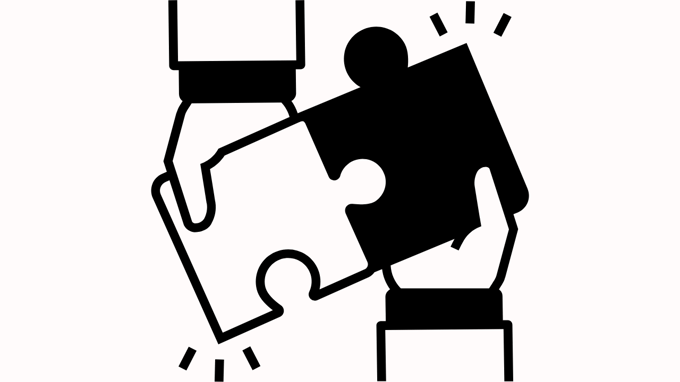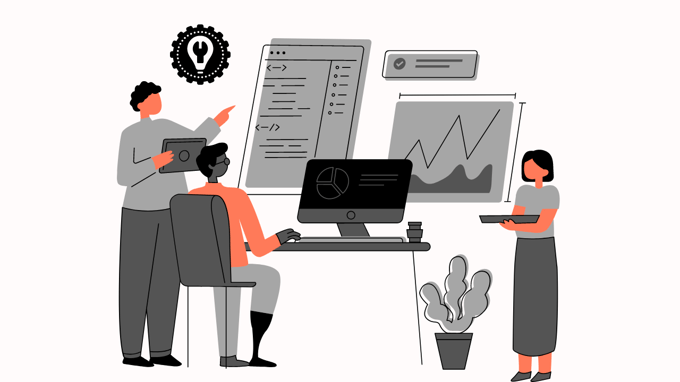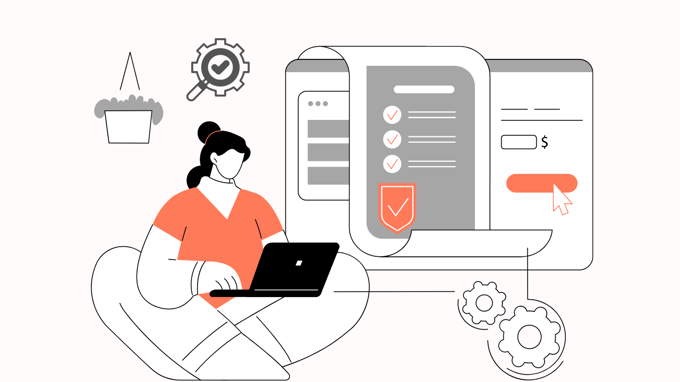Marketing Automation Platform Selection Made Easy in 2025
Tips for marketing automation platform selection, covering key factors, common mistakes, and finding a user-friendly, scalable solution for your...

Navigate the complexities of CRM selection and uncover key insights into the CRM selection process, from evaluating features to aligning with needs.
CRM stands for customer relationship management, it’s a process used for managing and analyzing a company’s interactions with both current and potential customers. It involves the use of the latest technology to organize, synchronize, and automate sales, customer service, and technical support to foster a holistic understanding of customer behaviors and needs.
CRM enables companies to build more meaningful and stronger relationships with their customers. Businesses gain insights by centralizing customer data and interactions leading to personalized communication and targeted marketing efforts. It further helps in higher retention rates, increasing customer loyalty, and a better understanding of customer preferences. Furthermore, CRM helps streamline processes, improve customer satisfaction, and a more efficient organization aiming for long-term business success.
In this read, we’ll go through a thorough and detailed process of CRM selection process to help companies find the best suitable solution for their needs.
The right selection of a CRM is crucial for any business’s success. Companies should use a systematic approach to ensure that the selected CRM not only aligns with organizational objectives but meets budgetary constraints as well.
Here's a step-by-step guide to help you navigate the complex landscape of CRM selection and choose the best one as per your business’s objectives:
When selecting a CRM solution, goal-setting matters most. You should have a clear understanding of your business objectives. Determine the specific goals for CRM implementation such as to improve customer communication, enhance data management, or streamline processes. Defining objectives is just like setting the foundation for a successful CRM strategy.

Companies may select a CRM system that not only meets their current demands but also fosters growth and success in the dynamic business environment. To ensure that the implementation of the CRM system proceeds smoothly and at a reasonable cost, a realistic budget must be allocated.
Evaluating current business processes can help identify areas where CRM can add significant value. Thus, companies can align CRM features with organizational needs and financial capabilities. For instance, lead scoring for SaaS businesses is often a useful feature therefore, make sure that such features are available in the CRM you're looking into.
Moreover, organizations may maximize the return on their investment with CRM systems by considering its advantages, including improved operational efficiency, customer satisfaction, and overall business impact.

You may select the ideal CRM system to support the growth of your company by examining the requirements of your business, the solutions that are most advantageous for your sector, and the system's ease of use, scalability, and safety.
Through a thorough examination of each solution, businesses can choose which CRM best suits their needs by understanding how it can assist with contact management, task automation, report generation, and system integration.
Choose the one that is aligned with your business requirements and helps achieve overall business success. By understanding the features and functionalities of each option, companies can narrow down choices based on alignment with business requirements. Make sure the CRM you’re choosing is scalable, easy to use, and has excellent integration capabilities.

Every organization needs a robust CRM system that can integrate seamlessly with its current workflows, enhance customer interactions, and streamline operations. After doing thorough research and shortlisting some of the best CRM options, reach out to shortlisted CRM providers. Request those providers to send you detailed proposals or product demonstrations to get a clear understanding so you can delve deeper into the capabilities of each CRM system and assess how well they meet your specific needs.

It's essential to personalize a CRM system to ensure that it precisely meets your unique business requirements. When the CRM solution providers send you proposals or demos make sure to assess the level of customization each CRM system offers.
You should determine how adaptable it is to unique business processes. A CRM system you choose should be flexible enough to accommodate your organization's specific workflows and requirements. The CRM must include robust functionalities and be compatible with various company models. For CRM to be effective, it must complement unique business processes.

Remember that the secret to success when selecting a CRM is its ability to integrate with other applications. Make sure that the CRM you choose ensures seamless integration with existing software applications.
Select a CRM that not only manages your data effectively but also transforms the way your team works. CRMs that prioritize efficient use of data and workflow may help you develop your business, assist your team, and enhance how your company operates.

When selecting a CRM system, factors like usability, user experience, and community support are sometimes ignored yet crucial considerations. An enhanced CRM experience will strengthen your team and support the ongoing expansion of your company.
In the dynamic realm of corporate technology, the effectiveness of a CRM system hinges on its actual usage by users. A CRM's success is mostly determined by how simple it is for users to use regardless of how many features it contains.

In addition to helping you set up the product, a seller who genuinely cares about your success will provide your team with the knowledge and resources they need to continue doing excellent work in the future.
You should investigate the level of support provided by your CRM provider. Your CRM solution provider should offer you training and prompt customer support because a responsive and supportive supplier helps for a successful CRM implementation.
For example, when choosing a HubSpot Partner for customized services, look for one who goes beyond the initial setup. Seek training programs, ongoing support, and resources tailored to your team's needs for long-term effectiveness.

Respecting data protection rules is essential to operating a responsible and long-lasting business. In the digital era, adhering to data security regulations not only helps you stay out of legal hot water but also fosters credibility and confidence. Ensure compliance with data protection regulations and verify the vendor's approach to data security and privacy. This is to safeguard sensitive customer information and maintain trust so you can be confident that the CRM you choose satisfies your company's demands and adheres to the finest data protection guidelines in the dynamic digital world.

To understand how well each CRM option meets your specific business’s needs, gather feedback from different departments. Collecting user feedback is invaluable in assessing the practicality and user-friendliness of the system. By incorporating many viewpoints, businesses may select a CRM that not only meets their primary objectives but also effectively supports every department. That’s how you can involve end users in the decision-making process and make an informed decision.

It is crucial to take into account both current and future expenses when selecting a CRM system. It helps in ensuring that financial choices align with the organization's objectives. By examining current costs, businesses may make informed decisions that align with their needs.
Compare costs with expected benefits and assess both short-term and long-term expenses associated with each CRM option. With a comprehensive cost-benefit analysis you can ensure that the chosen CRM system provides value over the long run.

An effective CRM facilitates a smooth setup process and fosters a solid rapport with the software provider. Finalize pricing, licensing terms, and contractual details by engaging with the selected CRM providers. Clear communication and negotiation foster a mutually beneficial partnership. You will have an excellent collaboration with the CRM provider if you are transparent, adaptable, and concentrated.

One of the most common mistakes companies make while selecting a CRM is rushing the decision-making process. Companies should take the time to thoroughly evaluate CRM options and ensure that the chosen system aligns seamlessly with their business needs and goals. That’s how, with a careful evaluation, companies can minimize the risk of investing in a solution that falls short of expectations.

You’ll face resistance during implementation if you don’t involve end-users in the CRM selection process. User feedback helps meticulously in assessing the practicality and user-friendliness of the system. The chances of a successful adoption become higher when you include the perspectives of those who will have to interact with the CRM daily.

The integration capabilities never be neglected as it is essential for CRM to seamlessly integrate with existing tools and applications to ensure streamlined workflows and data consistency. Overlocking this aspect may result in data silos and operational inefficiencies.

Proper training is essential to leverage the full potential of CRM and its successful implementation. Otherwise, it will become a reason for delay in user adoption and minimize the effectiveness of the CRM system.

Don’t ignore the scalability feature in a CRM as those systems can’t develop with your business leads to quickly outgrowing the system. The selected CRM should be scalable, adapting to the evolving needs and size of your organization.

Not paying attention to data security can lead to serious consequences such as data breaches and legal issues. Choose the one with robust security features to safeguard sensitive customer information and maintain compliance with data protection regulations.

Companies can’t underestimate the customization feature in a CRM as every business has unique processes, and underestimating customization needs can result in a CRM system that doesn't align with the process.

While cost is a crucial factor solely focusing on it may lead to choosing an inefficient solution that lacks critical features. Instead of solely focusing on upfront costs, consider the long-term benefits and value the CRM system brings to your organization.

Before committing or making a final decision, researching the vendor's reputation, support, and reliability is essential. Make sure the chosen CRM vendor has a track record of providing excellent support and reliable services to avoid potential issues down the road.

Implementing a new CRM system often brings organizational change and failure in planning for change management can lead to resistance and implementation challenges. For a more successful implementation, consider developing a comprehensive change management plan to guide your organization through the transition.

To sum up, selecting the best CRM is a significant undertaking that requires great consideration and planning. If an organization follows the 14 steps in the selection process, it may embrace CRM with confidence.
Every step of the process from defining objectives and including all interested parties to thoroughly reviewing all information, negotiating conditions, and finalizing arrangements helps make an informed decision.
The CRM you choose should meet your current business needs along with scaling your business’s growth. Investing time and effort into the selection process helps you in successful CRM implementation resulting in enhanced customer relationships and overall business efficiency.

Tips for marketing automation platform selection, covering key factors, common mistakes, and finding a user-friendly, scalable solution for your...

Explore the Ultimate Guide to selecting the best CRM for Roofers. Find the perfect CRM for roofers tailored to their unique business needs.

Explore the benefits and challenges of CRM in this comprehensive guide. Gain valuable insights into optimizing customer relationships for business...